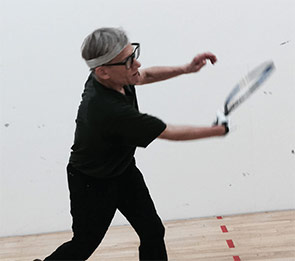
Like many rheumatologists who treat patients with rheumatoid arthritis, Richard Brasington, MD, professor in the division of rheumatology at the Washington University School of Medicine in St. Louis, knows that patients do better over the long term when they are vested in their care. Still, when he asked a new patient in March 2009 what he wanted to gain from treatment for RA, he was surprised by John Reigstad’s answer: “I want to get back to world-class tournament racquetball.”
“That wasn’t what I was expecting to hear,” Dr. Brasington now recalls. “What was striking was that the patient was asking for something that I thought probably was not achievable.”
It turns out that Dr. Brasington’s initial assessment of his patient’s goals was premature, because in John Reigstad he encountered an exceptional individual determined to remain active in the face of his rheumatoid arthritis and willing to be a full partner in the physician–patient relationship.
The Acute Phase
Reigstad’s symptoms had first appeared about six months earlier, in October 2008. As a champion racquetball player (Note: He won a world championship tournament in the men’s 55–59-year-old division in 2005), he was weight training for another competition when he injured his shoulder. At first, he attributed the event to incorrect positioning during a set of shoulder presses. But soon, his hands swelled and his body began to ache, and he realized something serious was going on. He remembers, “Trying to grip my racquet produced excruciating pain.”
Even at this stage, Reigstad employed remarkable coping strategies for dealing with the painful onset of his disease. As he became progressively weaker and unable to work out, exercise, lift weights or play racquetball, he joined the Botanical Gardens of St. Louis for daily walks and reprised his avocation as a nature photographer.
“Champions keep playing until they get it right.”
Finding the Right Combination
Reigstad first consulted his internist, who prescribed ibuprofen and acetaminophen, and eventually referred him to a rheumatologist. That physician started Reigstad on prednisone. But he was “never comfortable” taking the steroid and reports he didn’t get much relief. “About that time, I also developed frozen shoulder syndrome, so severe I could not thread my belt loops with my pants on. I full-dosed with ibuprofen and acetaminophen around the clock for six months with no feeling of progress. I kept searching for answers.” A racquetball opponent suggested Reigstad see the orthopedist that had done his shoulder replacement. After multiple cortisone injections, Reigstad’s shoulders improved, but his other symptoms had not.
Then his gym colleague, also a physics professor, suggested Reigstad “search for the best,” and that led him to Dr. Brasington at Washington University.
From the start, the patient was an active participant in treatment decisions. Dr. Brasington recalls that Reigstad responded well to first-line treatment with methotrexate. Together they negotiated dosage adjustments: After several months on 20 mg of MTX, Reigstad complained of nausea and Dr. Brasington reduced his dose to 17.5 mg. They negotiated a further reduction to 15 mg, at Reigstad’s request, on the condition that the dosage would be increased or switched to injectable form, or other options would be considered, such as biologics, if his condition worsened.
Within six months of beginning treatment with MTX, Reigstad’s hand swelling and pain had diminished enough to resume play. To do so, he still needed to make some adjustments to manage the pain. He asked a pro shop to increase the circumference of his racquet grip from 3 1/8″ to 10 1/2″, thus “inventing” his own orthotic grip. He steadily increased his workouts to make up for lost muscle mass, paid careful attention to self-care, and in 2011 placed fourth in the U.S. Open Racquetball Championships in the men’s 60–64-year-old division.
He now cheerfully says, “All these transitions enabled me to play racquetball nearly every day in 2014, sometimes against A-rated opponents who could be my grandsons, and, as Dr. B. says, ‘kick their asses!’”

Physician’s Lessons Learned
Dr. Brasington agrees that Reigstad is a remarkable person who is wholly engaged in his own care. He advises colleagues to attempt to understand, from the patient’s perspective, what problems the disease is causing and what changes the patient wants to see. He believes most patients are more concerned about function and quality of life than measurable indicators, such as radiographs, SED RTE, rheumatoid factor, RAPID 3s or their DAS scores. “But those things [function and quality of life] are not so easily measured,” he notes. “In this era of ‘treat to target,’ it’s important to recognize how much improving quality of life matters and that the patient can help us tell how they’re doing. So it’s a good idea to dig a little deeper, not make too many assumptions and to ask patients what they are hoping to achieve.”
Turning Losses into Assets
When asked what accounts for his resilience in dealing with RA, Reigstad, a Lutheran minister and a professor of philosophy at St. Louis University, notes that he has learned to look at the big picture of treatment, recovery and life. That entails, among other things, using the power of rest periods to enable daily activities, helping friends and loved ones understand the disabling fatigue crashes of RA, nurturing the enjoyment of self and finding a rheumatologist who’s a good match. Since our last interview, he’s also been dealing with osteoarthritis in his knee, but with the same characteristic optimism and purpose. “I always treat any illness, symptom or problem as something I can overcome,” he states. “My father died on my 9th birthday, and it took 20 years to get over that. Every other problem now seems like a piece of cake.”
Gretchen Henkel is a medical journalist based in California.

